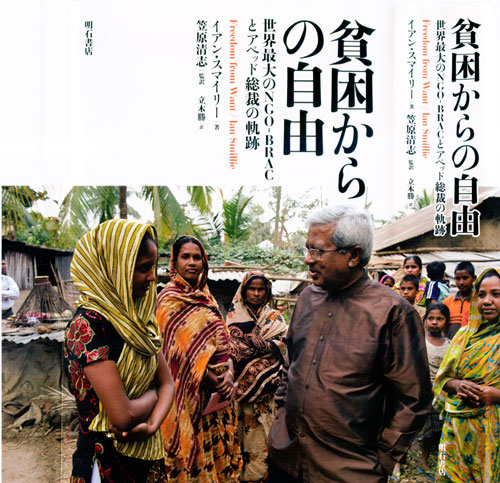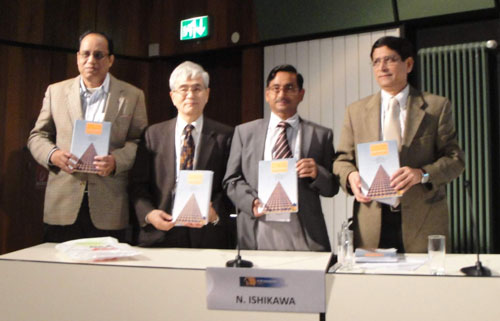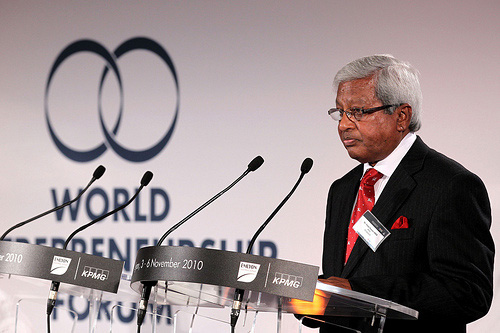
News (832)
BRAC Book "Freedom from Want" by Ian Smillie is now available in Japanese Version

06 December 2010, Dhaka. A Japanese translation of the book ‘Freedom From Want’ has been published by Kumarian Press, Sterling, Virginia through Tuttle-Mori Agency Inc., Tokyo. The original English edition was written by Ian Smillie and was published in 2009. Freedom From Want traces BRAC’s evolution from a small relief operation indistinguishable from hundreds of others, into what is undoubtedly the largest and most variegated social experiment in the developing world. BRAC’s story shows how social enterprise can trump corruption and how purpose, innovation and clear thinking can overcome the most entrenched injustices that society can offer.
Book on Scaling up Health Programmes launched
29 November 2010, Dhaka. A new book titled “From One to Many: Scaling Up Health Programs in Low Income Countries” was recently launched in Germany and Switzerland. Published by University Press Limited of Dhaka, the book has 17 chapters, including 4 on Bangladesh.
This edited volume is a collection of articles by eminent researchers and practitioners from around the world that were submitted to the International Conference on Scaling Up Health Programs that was held in Dhaka, Bangladesh in December 2008.
In Germany, the book was launched in Berlin during the 41st International Union against Tuberculosis and Lung Disease (IUATLD) World Conference on Lung Health (11 – 15 November, 2010). It was formally launched by Dr. Nobukatsu Ishikawa, the Director of the Research Institute of Tuberculosis (RIT), Japan.
 Jalaluddin Ahmed (Asso. Director, BRAC Health Programme), and Dr. Nobukatsu Ishikawa, the Director of the Research Institute of Tuberculosis (RIT), Japan, AKM Amir Hossain (Additional Secretary, MoHFW, GoB), Faruque Ahmed (Director, BRAC Health Programme) - at the launch of the book
Jalaluddin Ahmed (Asso. Director, BRAC Health Programme), and Dr. Nobukatsu Ishikawa, the Director of the Research Institute of Tuberculosis (RIT), Japan, AKM Amir Hossain (Additional Secretary, MoHFW, GoB), Faruque Ahmed (Director, BRAC Health Programme) - at the launch of the book
While in Switzerland, it was launched in Montreux during a conference on health system research (16 – 19 November, 2010) organised by World Health Organization (WHO). Dr Judith Rodin, the President of the Rockefeller Foundation, who was the chief guest on the occasion, formally launched the book. Three of the editors of the book Faruque Ahmed (Director, BRAC Health Programme), Richard Cash (Senior Lecturer at the Harvard School of Public Health and Visiting Professor at BRAC University) and Dr. A. Mushtaque R. Chowdhury (Associate Director of the Rockefeller Foundation and Professor at Columbia University) were also present at the launching.
Book on Scaling up Health Programmes launched
29 November 2010, Dhaka. A new book titled “From One to Many: Scaling Up Health Programs in Low Income Countries” was recently launched in Germany and Switzerland. Published by University Press Limited of Dhaka, the book has 17 chapters, including 4 on Bangladesh.
This edited volume is a collection of articles by eminent researchers and practitioners from around the world that were submitted to the International Conference on Scaling Up Health Programs that was held in Dhaka, Bangladesh in December 2008.
In Germany, the book was launched in Berlin during the 41st International Union against Tuberculosis and Lung Disease (IUATLD) World Conference on Lung Health (11 – 15 November, 2010). It was formally launched by Dr. Nobukatsu Ishikawa, the Director of the Research Institute of Tuberculosis (RIT), Japan.
 Jalaluddin Ahmed (Asso. Director, BRAC Health Programme), and Dr. Nobukatsu Ishikawa, the Director of the Research Institute of Tuberculosis (RIT), Japan, AKM Amir Hossain (Additional Secretary, MoHFW, GoB), Faruque Ahmed (Director, BRAC Health Programme) - at the launch of the book
Jalaluddin Ahmed (Asso. Director, BRAC Health Programme), and Dr. Nobukatsu Ishikawa, the Director of the Research Institute of Tuberculosis (RIT), Japan, AKM Amir Hossain (Additional Secretary, MoHFW, GoB), Faruque Ahmed (Director, BRAC Health Programme) - at the launch of the book
While in Switzerland, it was launched in Montreux during a conference on health system research (16 – 19 November, 2010) organised by World Health Organization (WHO). Dr Judith Rodin, the President of the Rockefeller Foundation, who was the chief guest on the occasion, formally launched the book. Three of the editors of the book Faruque Ahmed (Director, BRAC Health Programme), Richard Cash (Senior Lecturer at the Harvard School of Public Health and Visiting Professor at BRAC University) and Dr. A. Mushtaque R. Chowdhury (Associate Director of the Rockefeller Foundation and Professor at Columbia University) were also present at the launching.
BRAC in Pakistan awarded by MIX
23 November 2010, Islamabad. BRAC in Pakistan has been awarded with a Silver award; jointly from CGAP (Consultative Group to Assist the Poor), the Michael & Susan Dell Foundation and Ford Foundation for reporting on social indicators to the MIX (Microfinance Information Exchange).
The social performance reporting awards showcases the achievements of those MFIs (Microfinance Institutions) that are committed to transparency and accountability by reporting the way their efforts directly impact poor clients. The awards provide a yardstick for those wanting to assess an MFI’s commitment not only showing progress in helping its clients, but also supporting its staff, and protecting the environment.
The Silver award is awarded to MFIs that complete the social performance report, and also provide full data on poverty measurement.
BRAC has been operating in Pakistan since 2007.
Membership in International Federation of Training & Development Organizations
21 November 2010, Dhaka. BRAC’s Training Division has recently become an associate member of International Federation of Training & Development Organizations (IFTDO). The IFTDO is the world-wide federation (UK based) formed in 1972 to develop and maintain a world-wide network committed to the development and transfer of knowledge, skills and technology to enhance personal growth, human performance, productivity and sustainable development. Through its member organisations it represents more than 500,000 professionals in 50 countries.
BRAC’s Training Division works to develop the capacity of all BRAC employees as well as its volunteer workforce through regular and skills training. There are 20 Training and Resource Centres in Bangladesh. Training Centres have also been set up in Afghanistan, Sierra Leone, Southern Sudan, Tanzania and Uganda.
Uganda's Finance Minister Commends BRAC's Work

9 November 2010, Dhaka. During a recent visit to BRAC Uganda's Agriculture Research and Seed Production Center in Nakaseke district, Uganda’s Finance, Planning and Economic Development Minister, Honorable Syda Bhumba, commended BRAC for becoming one of the most successful nongovernmental organizations internationally.
“BRAC has set up a global record for establishing world class development programs. They are very successful in microfinance and they are considered to be one of the most successful organisations globally,” Minister Bhumba said during her visit.
The 53 acre Agriculture research center in Nakaseke District has been established with the purpose of testing and replicating new high yielding disease resistant seed varieties. Lack of access to good quality seeds at affordable cost is one of the fundamental challenges faced by farmers in Uganda. BRAC Uganda currently provides agricultural extension services to more than 50,000 farmers in the country through its vast network of microfinance branches. The services are provided at the village level through franchised entrepreneurs selected by BRAC Uganda from the pool of microfinance borrowers. BRAC Uganda's portfolio of 'microfinance multiplied' programs, including the agriculture extension services, are implemented in partnership with the MasterCard Foundation.
During Minister Bhumba’s visit to the Agriculture Research Center in Nakaseke, BRAC Uganda’s Country Program Head, Ariful Islam, said that the organization’s agriculture, poultry and livestock programs are aimed at helping to meet the food security needs and household incomes of the small farmers, especially women. He said this was done through offering extension services, improved seeds and training.
Mr. Islam said that the facility in Nakaseke would go a long way in meeting BRAC’s goal of contributing to Uganda’s “Prosperity for All” program. The center with an initial capacity of 25 residential trainees will train both extension workers as well as farmers in modern agricultural practices and will be open for use to other partners in the industry.
“Our future plans include large scale production and marketing of improved seeds for both the local market and the market in the region,” Mr. Islam said.
The minister said that BRAC interventions in the country were alleviating problems that were identified in the government’s National Development Plan. She reiterated the challenges faced by the farmers, which include, lack of quality seeds, lack of marketing structure, lack of credit appropriate for agriculture, lack of extension services, lack of market infrastructure and value addition and lack of high yielding seeds.
She said seeds on the market were very expensive, at Shs2,500 per kilogram, and quite often farmers were sold fake seeds.
“We have only three seed companies in a country of over 30 million people, 80% of who depend on agriculture. The few seed companies are monopolistic and therefore charge high prices. So, BRAC will offer competition and, thus, lower prices,” the Minister said.
‘Inter College Debate Competition 2010, Dhaka’- Successfully Concluded
8 November 2010, Dhaka. As a part of the national level campaign on ultra poverty reduction, BRAC Advocacy Unit has successfully completed the week long ‘Inter College Debate Competition 2010 Dhaka’ (from November 2 to November 8) on ultra poverty issues at the Asiatic Society of Bangladesh.
On November 8, we hosted the final debate between Dhaka College and Dhaka Commerce College which was followed by a grand closing ceremony. The topic of the final debate was “Exact budgetary allocation will best contribute to alleviate extreme poverty.” Dhaka College came out as the champions and Dhaka Commerce College became the runners up of the competition beating 14 other renowned colleges from the city. Nahian Bin Khaled from Dhaka College was voted ”Best Speaker.”
The week long event full of logic, argument, agreement, disagreement and rebuttal came to an end following a grand closing where Suranjit Sengupta, Co-chair, Constitutional Amendment Committee & Chair, Parliamentary Standing Committee on the Law, Justice and Parliamentary Affairs Ministry was present as the Chief Guest and Sheepa Hafiza, Director, Gender Justice & Diversity and Advocacy, BRAC chaired the session. Professor Ainun Nishat, Vice Chancellor, BRAC University, Professor Sirajul Islam, President, Asiatic Society of Bangladesh, Professor Mafuza Khanam, General Secretary, Asiatic Society of Bangladesh and Mr. Abu Syed Khan, Executive Editor, the Daily Somokal were present as the Special Guests in the session. The guests highlighted BRAC’s contribution in extreme poverty reduction of our country. They also appreciated our initiatives to mobilise the youth in favour of the ultra poor through a scholarly tool like debate.
To increase youth participation in favour of the ultra poor, BRAC Advocacy Unit regularly organises quizzes, seminars and debates at grassroots to national level. This debate competition was another step to reach the youth group.
At the end of the debate a student forum titled "Poverty Alleviation Forum" was formed with the debaters from 16 colleges along with some members from Dhaka University Debating Society (DUDS) who will actively work on ultra poverty issues.
BRAC Advocacy Unit intends to take the students of the forum to field visits in order to get firsthand knowledge about the ultra poor. They will then carry out dialogue sessions and issues based activities on ultra poverty and thus contribute in the ultra poverty reduction of the country. We strongly believe such involvements in a national agenda will engage the students as ambassadors of social change both at family and community level.
‘Inter College Debate Competition 2010, Dhaka’- Successfully Concluded
8 November 2010, Dhaka. As a part of the national level campaign on ultra poverty reduction, BRAC Advocacy Unit has successfully completed the week long ‘Inter College Debate Competition 2010 Dhaka’ (from November 2 to November 8) on ultra poverty issues at the Asiatic Society of Bangladesh.
On November 8, we hosted the final debate between Dhaka College and Dhaka Commerce College which was followed by a grand closing ceremony. The topic of the final debate was “Exact budgetary allocation will best contribute to alleviate extreme poverty.” Dhaka College came out as the champions and Dhaka Commerce College became the runners up of the competition beating 14 other renowned colleges from the city. Nahian Bin Khaled from Dhaka College was voted ”Best Speaker.”
The week long event full of logic, argument, agreement, disagreement and rebuttal came to an end following a grand closing where Suranjit Sengupta, Co-chair, Constitutional Amendment Committee & Chair, Parliamentary Standing Committee on the Law, Justice and Parliamentary Affairs Ministry was present as the Chief Guest and Sheepa Hafiza, Director, Gender Justice & Diversity and Advocacy, BRAC chaired the session. Professor Ainun Nishat, Vice Chancellor, BRAC University, Professor Sirajul Islam, President, Asiatic Society of Bangladesh, Professor Mafuza Khanam, General Secretary, Asiatic Society of Bangladesh and Mr. Abu Syed Khan, Executive Editor, the Daily Somokal were present as the Special Guests in the session. The guests highlighted BRAC’s contribution in extreme poverty reduction of our country. They also appreciated our initiatives to mobilise the youth in favour of the ultra poor through a scholarly tool like debate.
To increase youth participation in favour of the ultra poor, BRAC Advocacy Unit regularly organises quizzes, seminars and debates at grassroots to national level. This debate competition was another step to reach the youth group.
At the end of the debate a student forum titled "Poverty Alleviation Forum" was formed with the debaters from 16 colleges along with some members from Dhaka University Debating Society (DUDS) who will actively work on ultra poverty issues.
BRAC Advocacy Unit intends to take the students of the forum to field visits in order to get firsthand knowledge about the ultra poor. They will then carry out dialogue sessions and issues based activities on ultra poverty and thus contribute in the ultra poverty reduction of the country. We strongly believe such involvements in a national agenda will engage the students as ambassadors of social change both at family and community level.
BRAC Chairperson speaks at World Entrepreneurship Forum 2010

4 November 2010, Lyon. Sir Fazle Hasan Abed, Founder and Chairperson of BRAC, attended the 2010 edition of the World Entrepreneurship Forum held in Lyon, France, earlier this month. This annual event gathers more than 100 personalities, from more than 50 countries, to share best and continuously renewing practices and to promote entrepreneurship and social justice on a global scale.
In 2009, at last year’s forum, Sir Fazle was awarded the first ever ‘Entrepreneur for the World’ Award in the ‘Social Entrepreneur’ category. He was invited to be a guest speaker at the ‘Learning from Entrepreneurs’ conference at this year’s event.
In his speech at the EMLYON Business School Campus, Sir Fazle shared his insights on his concept on development of social entrepreneurship to fight against poverty, and about social entrepreneurs’ acting and working as “global citizens”.
Sir Fazle commends the “emerging group of business entrepreneurs, whose bottom line is not single but triple” in creating “societal, environmental and stakeholder value”, along with the “social entrepreneur driven by the need to take actions and whose economic, social and environmental impact always results in greater social good”.
The World Entrepreneurship Forum is the first global think tank dedicated to entrepreneurs, creators of wealth and social justice, founded by EMLYON Business School and KPMG.
Photo Copyright (c) EMLYON business school
BRAC Chairperson speaks at World Entrepreneurship Forum 2010

4 November 2010, Lyon. Sir Fazle Hasan Abed, Founder and Chairperson of BRAC, attended the 2010 edition of the World Entrepreneurship Forum held in Lyon, France, earlier this month. This annual event gathers more than 100 personalities, from more than 50 countries, to share best and continuously renewing practices and to promote entrepreneurship and social justice on a global scale.
In 2009, at last year’s forum, Sir Fazle was awarded the first ever ‘Entrepreneur for the World’ Award in the ‘Social Entrepreneur’ category. He was invited to be a guest speaker at the ‘Learning from Entrepreneurs’ conference at this year’s event.
In his speech at the EMLYON Business School Campus, Sir Fazle shared his insights on his concept on development of social entrepreneurship to fight against poverty, and about social entrepreneurs’ acting and working as “global citizens”.
Sir Fazle commends the “emerging group of business entrepreneurs, whose bottom line is not single but triple” in creating “societal, environmental and stakeholder value”, along with the “social entrepreneur driven by the need to take actions and whose economic, social and environmental impact always results in greater social good”.
The World Entrepreneurship Forum is the first global think tank dedicated to entrepreneurs, creators of wealth and social justice, founded by EMLYON Business School and KPMG.
Photo Copyright (c) EMLYON business school
Join the world’s biggest family




